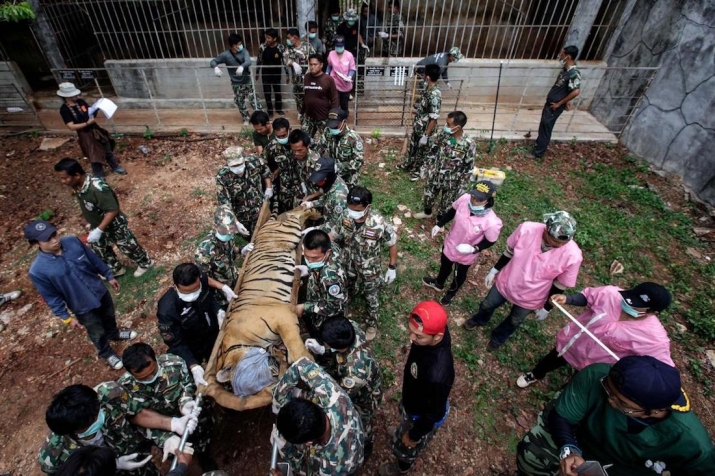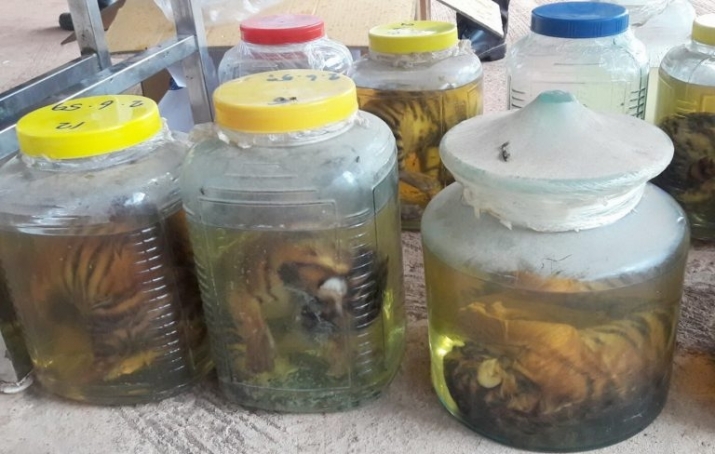NEWS
New Tiger Zoo to Open Beside Thailand’s Infamous “Tiger Temple”
 A tourist poses for a photo with a tiger at a tourist attraction in Thailand. From worldanimalprotection.org
A tourist poses for a photo with a tiger at a tourist attraction in Thailand. From worldanimalprotection.orgSome nine months after more than 100 tigers were confiscated in a dramatic police raid led by Thailand’s Department of National Parks, Wildlife and Plant Conservation, the infamous “Tiger Temple,” formally known as Wat Pa Luangta Maha Bua Yannasampanno, may be planning a comeback, with a new zoo set to open on a 4 hectare site next to the temple in the Western Thai province of Kanchanaburi.
The Buddhist temple, founded in 1994 and a popular tourist attraction, ran its tiger operation for more than 10 years despite concerns about involvement in the illegal wildlife trade and the possible mistreatment of tigers for commercial gain voiced by animal welfare groups. In last year’s government raid, 137 tigers were seized and the operation was closed after police found evidence of possible involvement in the trafficking of tigers and their body parts. Some of the confiscated tigers were found to have physical deformities allegedly caused by inbreeding. The authorities were also reported to have discovered the frozen bodies of 40 tiger cubs, the body of a small bear, cured tiger pelts, claws used to make magic amulets, tiger-based energy drinks, and dozens of bottles containing dead tiger cubs.
Since the highly publicized raid, the Buddhist temple’s abbot, Phra Wisutthi Sarathera, known locally as Luang Ta Chan, and representatives of the temple have repeatedly denied any wrongdoing. With seven open legal cases relating to the Tiger Temple, the abbot has not been charged with any crimes, and a police investigation into the temple’s employees and monks is still ongoing.
 The temple's abbot, Phra Wisutthi Sarathera, known locally as Luang Ta Chan, has denied any wrongdoing. From dailymail.co.uk
The temple's abbot, Phra Wisutthi Sarathera, known locally as Luang Ta Chan, has denied any wrongdoing. From dailymail.co.ukThe Golden Tiger (Thailand) Co., Ltd., is reported to have received a provisional license for the new zoo, which is currently under construction, transferred over from Tiger Temple Co., Ltd. The Associated Press reported that Saiyood Pengboonchu, a lawyer representing the temple, said the new zoo, which is expected to be completed in two to three months, has no affiliation with the Tiger Temple. Yet animal welfare groups remain concerned that the new zoo will be run by the same people.
“Given the appalling conditions at the former Tiger Temple, which ultimately led to its closure, we’re urging the Thai government not to activate the full zoo license needed for another tiger entertainment venue to be opened,” said the non-profit animal welfare organization World Animal Protection. (World Animal Protection)
In April 2016, the Department of National Parks, Wildlife and Plant Conservation issued a license to Tiger Temple Co. Ltd. for a “safari-style” tiger attraction. In December last year the company requested permission to buy 105 tigers from Mali-Salika Zoo in central Thailand, which had filed papers to close. According to media reports, the zoo bred tigers but had never admitted tourists.
 Wildlife authorities remove a sedated tiger during the raid on the temple in June 2016. Photo by Dario Pignatelli. From nationalgeographic.com
Wildlife authorities remove a sedated tiger during the raid on the temple in June 2016. Photo by Dario Pignatelli. From nationalgeographic.comAdisorn Noochdamrong, a former director general of the Department of National Parks, Wildlife and Plant Conservation who led last year’s raid on the temple, said the new project was legal as the zoo was registered two months before the police operation began. “They have the right to do that,” he said, although he expressed doubt that the zoo will be ready to open in March. Construction is not finished, he noted, and wildlife officials will need to inspect the site to see whether it can accommodate the proposed number of tigers. (Khaosod English)
Adisorn blamed the police for the slow progress of the prosecution case against the temple. “For example, when we followed up on the case, it turned out some suspects that we named among the accused were missing from the case file compiled by the investigators,” he said. “So we had to protest and show them documents, and they had to spend more time revising the case file.” (Khaosod English)
Thailand has more than 1,000 tigers in captivity, however fewer than 4,000 remain in the wild, according to the World Wildlife Fund. In a report release last year, World Animal Protection documented a 33 per cent increase in the number of tigers at tourism-related facilities over a five-year period.
“Tiger farms have nothing to do with conservation—it just brings extreme suffering to these wild animals whilst living in appalling conditions,” said Dr. Jan Schmidt-Burbach, senior wildlife and veterinary advisor for World Animal Protection. “These venues need to be stopped in their tracks because they clearly have links to the dark side of wildlife trafficking rings.” (World Animal Protection)
 Bottles containing dead tiger babies reportedly found during last year's raid on the Tiger Temple. From khaosodenglish.com.jpg
Bottles containing dead tiger babies reportedly found during last year's raid on the Tiger Temple. From khaosodenglish.com.jpgSee more
TIGER TEMPLE TO REOPEN 9 MONTHS AFTER RAID (Khaosod English)
Months After Raid on Infamous Tiger Temple, Plans for Offshoot Zoo Forge Ahead (National Geographic)
Fear for tigers, as company behind cruel Tiger Temple plans to open a new venue (World Animal Protection)
New zoo planned next to Tiger Temple (Bangkok Post)
Infamous Thai Tiger Temple To Reopen Under New Name (Vocative)
'Breakfast with tigers': Thailand's infamous Tiger Temple to open new attraction (Sydney Morning Herald)
Wat Pa Luangta Maha Bua Yannasampanno (Tiger Temple), Thailand
Related news from Buddhistdoor Global
Thailand’s “Tiger Temple” Refuses to Surrender Tigers
Sri Lanka Approves New Legislation to Protect Elephants
Scientists Urge Endangered Status as Cheetah's Race to Escape Extinction
Buddhist Monk Wins Wildlife Service Award
Even Christmas Is Not Immune to Climate Change; Scientists Warn of Shrinking Reindeer
New Report Shows Snow Leopards Under Grave Threat from Poaching
New Wildlife Reserve Could Help Save China’s Big Cats
Related features from Buddhistdoor Global
The Honey-offering Festival: Commemorating the Service of Animals to the Buddha
Rethinking Life Release
Love Letter to the Earth – Book Review














